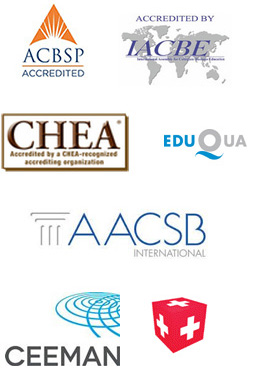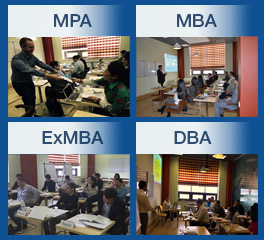Course Disciplines
Marketing Management
The course will address the subject of marketing and marketing management at a broad but comprehensive level. The initial phase will provide participants with an understanding of the nature and scope of modern marketing. The concept of knowledge based organisations and how to capture marketing insights will be covered. Customer relationships and interaction will be addressed. Branding will be studied. Development of marketing strategies and mix will be evaluated.
Financial Management
The purpose of this class is to make an interactive class with exchange of information and experiences or non-experiences. The focus of the course is on the corporate finance manager and how he/she reaches decisions as to capital investments, dividends and financing of all sorts. Throughout there is a strategic perspective. The course embraces both the “big picture” and rigorous financial analysis. Both lectures and case discussions will be used. As not all students will be familiar with mathematics and statistics (important instruments in finance), the course will be done as “un-mathematically” as possible.
The students will be able to synthesize, interpret and communicate complex ideas and have a deeper understanding of the connection between financial theory and practice, i.e. in - risk and return; -capital budgeting; capital structure.
Organizational Behavior and Leadership
The purpose of this course is to create a knowledge base from which students can develop organizational competence. It examines the relations between organizational performance and the behavior of individuals, groups and overall organizations. In the process, emphasis is given to the importance of interpersonal issues and to issues arising from technological, workplace diversity, leadership styles and globalization.
Financial Theory and Accounting
This financial accounting course introduces the relevant concepts of accrual based accounting, and, with lesser emphasis, cash based accounting. The course follows the textbook very closely: Essentially all 12 chapters will be covered in the short timeframe. Many concepts will be discussed in the context of Starbucks Inc. The financial statements are in the textbook and highlight their application in practice. There is a pre-assignment to be handed in before class starts, a group exercise and quizzes in will be completed in class (not graded) and homework problems after the class (not graded). The final exam will be the crucial learning evaluation tool.
Operations Management
As goods and services are produced and distributed they move through a set of interrelated operations and processes with the primary goal for the organizations to maximize their value to the customer. The design of these operations for achieving strategic advantage, improving and controlling them to meet the organization’s performance objectives is the domain of Operations Management. Successful organizations now routinely collect and analyze data in order produce forecasts that support informed decision making.
New Venture Creation
An international cross-disciplinary semester with focus on business creation and business management. It is a real-life experience in entrepreneurship. And it is an opportunity for students to learn how to start your own company, design sustainable business models, and importantly – interact with a lot of interesting business people through professional discussions.
Managerial Economics
The purpose of this course is to create a knowledge base from which students can develop organizational competence. It examines the relations between organizational performance and the behavior of individuals, groups and overall organizations. In the process, emphasis is given to the importance of interpersonal issues and to issues arising from technological, workplace diversity, leadership styles and globalization.
Communication and Negotiation Skills
This course will enable students to further develop their communication and negotiation skills for business purposes (“Functional Business Communication”). Through the use of relevant specialist literature, exercises, role plays and case studies, students will be able to recognize essential characteristics of a communication situation chose their own appropriate strategy and accordingly apply effective communication techniques. Students will also strengthen their cross-cultural awareness and critically consider ethical aspects in negotiations.
Accounting Skills
This module develops students’ knowledge and skills in strategic decision making in a real world context. Students also develop their critical ability in understanding issues in accounting and its strategic and behaviour impact on the creation of competitive advantage.
International Business Finance
Multinational Finance can be thought as an extension of the domestic financial operations, as such there is no objective conflict between domestic and multinational finance. They are both concerned with how to make the best decision to maximize value for firms. The key concept is cash flow. The primary objective of the multinational corporation (MNC) is still the same primary objective of any firm: to maximize shareholder wealth.
Human Resources Management
This course will enable students to develop short and long-range plans to effectively accomplish organizational goals. Through the use of terminology, exercises and case studies, students will be able to give a critical appraisal of real life situations involving organizing, staffing and motivating others. The student will also learn tools to aid in problem solving, valuing diversity and coping with change.
Management Information Systems
The idea behind this module is to explore various different ways in which information technology relates to organisational objectives and goals in an organisational context, given the increasing inter-relationship between these two in today’s global world. The students will get a basic knowledge about information systems and their impact on business processes. This course examines the fundamental principles associated with the strategic adoption, implementation, use and evaluation of information systems in organisations. It discusses the significant managerial aspects of treating information as an organisational resource and its increasing impact on today’s organisation.
Business Policy and Strategy
In this course, students will review the management process and how strategy fits into that process. Further, they will learn how to apply business principles and change management concepts in the strategy process. Theoretical models will be used to analyse textbook and real-world case studies. Upon completion of this course, students will have a deeper appreciation of the complexity and sophistication of management issues which have arisen due to the growth of international competition and the ways in which multinational corporations are evolving with globalization.
International Marketing and Research
The course will illustrate the added complexity deriving by the implementation of the marketing theory across different cultures, legislations and political environments, and will provide a systematic framework for designing marketing strategies and policies, with a focus on the development and execution of programs, audits, and plans. The scope is to develop skills in planning a variety of international marketing management tools, in organizing more effective international strategic marketing and in implementing the international market planning process.
International Business Competitiveness
The module explores the factors of national and international competitiveness from the perspective of companies, clusters, states or regions. It addresses issues from a bottom -up, firm based microeconomic perspective and focuses on the importance of local clusters for the success of firms and regions. Through case studies and plenary discussion, students will be introduced to cluster theory and probe in detail the ultimate sources of competitiveness and clusters, as well as the quality of the micro and macro business environment in which competition takes place, and what can be done to encourage competitiveness.
Master's Thesis Defense

MBA Success Stories
World Bank Project Consultant

I really like to study MBA from SBS Swiss Business School in ASMB. The quality of education has surpassed my expectations. It is encouraging that a lot of attention is paid to the practical component of training programs. I also like the small size of our group, which makes it possible to provide an individual approach by business school and its lecturers. I believe that the teaching staff is perfectly correspond towards the specifics of the courses taught. The presence of lecturers from Europe, USA and CIS countries and Kazakhstan, with great practical experience is exactly what allows me to get the world's best knowledge adapted to the realias of our business. I would describe the atmosphere of the school in two words: comfortable and friendly. I want to go back there again and again.
Aigerim Baizhumanova,
World Bank Project Consultant
Director at ConocoPhillips

Many thanks to the SBS for the opportunity to take ExMBA course in Astana. I am quite satisfied with the quality of education. Lecturers are skilled practitioners. The training plan has been developed quite efficiently. The atmosphere in the office and in the classroom is welcoming and friendly enough and working at the same time. All the information (regarding the changes in the schedule and about lecturers, etc.) is provided on time. Special thanks to Farida and Zhuldyz for arranging workplace and creating a friendly atmosphere and helpfulness.
Almagul Ashikova,
Director at ConocoPhillips
ExMBA Student
Executive Assistant to CEO, Kazzinc, LLP

I like to study ExMBA program in ASMB Astana School of Management and Business.
I am satisfied with the quality of training and, furthermore, the organization of the learning process has exceeded my expectations!
The high professional level of lecturers.
The teaching of subject is more focused on practical examples that enables a greater understanding of the theoretical issues.
Konstantin Vidyakin,
Executive Assistant to CEO, Kazzinc, LLP
ExMBA Student
Kazzinc, LLP Branch Director in Almaty

I like to study ExMBA in ASMB. I am satisfied with the quality of teaching. A very high level. The level of lecturers is very high. It is important, in my opinion, is that they have practical experience in addition to a good theoretical basis. The atmosphere at the school is very nice and comfortable, very friendly, professional staff who provide support in any issues. It would be nice to get a preliminary distribution of CV teachers and materials.
Marina Kaminskaya,
Kazzinc, LLP Branch Director in Almaty
ExMBA Student
IT Department Head at Kazzinc-Avtomatika, Kazzinc LLP

An ExMBA training program at ASMB fully meets my expectations. As befits a business education, it allows you to arrange the knowledge and collected experience, to learn new management tools, and apply it all to my business activities. Certainly, I am satisfied with quality of education. Although I already have such a degree, I keep finding and discovering something new both in theory and in practice. Regarding teachers, it is a good team of professionals. Moreover, it applies to all teachers from Switzerland, Kazakhstan and Russia. It is very cozy, compact and functional at school. If it was stairs that changed/moved in Hogwarts, in ASMB – walls :)
Dear future students! Do not be afraid to learn! The worst thing is not that you do not know something, but that are you afraid to admit it and do not try to fix it ... Because of your ignorance you can be guided by the mistaken belief creating chaos around yourself. Spend your time right now for quality business education and in the future, you will have more time to spend with your family without "sinking into the routine management"!
Maksim Gaifullin,
IT Department Head at Kazzinc-Avtomatika, Kazzinc LLP
ExMBA Student









